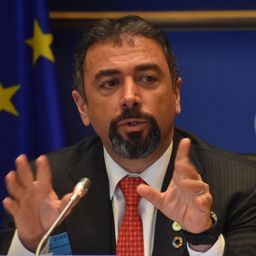
Leandro Pecchia is a Professor of Biomedical Engineering (Electronic and informatics bioengineering (ING-INF/06). He graduated in EEE with specialization in Biomedical Engineering in 2005 at the University “Federico II” of Naples, where he received also the PhD in Biomedical Engineering and Management of Healthcare Services in 2009. After a brief appointment as Post-Doc Research Fellow (PDRA) at UNINA, he moved to the UK, where we joined the University of Sheffield (2008-2009) as Visiting Research Student, then the University of Nottingham as PDRA (2011-2013), and in 2013 the University of Warwick, where he has still a part0time appointment, as Professor of Biomedical Engineering. Since 2014, he directed the Applied Biomedical Signal Processing and Intelligent eHealth Lab (ABSPIE), which focuses on design of medical devices, applications of Artificial Intelligence and Internet of Things (IoT) for Active and Healthy Ageing and for the management of chronic conditions.
Since September 2020, Prof Pecchia is the innovation manager for the non-pharmacological COVID-19 technologies at the World Health Organization (WHO) Emergency program (WHE) in the Infection Prevention and Control (IPC) unit.
He authored more than 200 peer-reviewed papers on journals, books and conferences in the fields of medical devices, biomedical signal processing, Health Technology Assessment (HTA), Internet of Things and machine learning and AI applied to active and healthy ageing and management of chronic diseases (Prof Pecchia updated publication list).
Dr Pecchia is a proactive member of several scientific societies and NGOs in official relations with the United Nations.
Currently, he is President (2021-23) of the European scientific society of biomedical engineering (EAMBES), Secretary General (2022-25) of the International Federation of Medical and Biological Engineering (IFMBE). In the Past he has been the Secretary General (2018-2022) of the International scientific society of medical physics and biomedical engineering (IUPESM), Treasurer (2018-2022) of the IFMBE Clinical Engineering Division, and former IFMBE Healthcare Technology Assessment Division Chair (2015-18) and Treasurer (2012-15).
In 2015, as EAMBES Public Affairs Councillor, he established the first European Parliament Interest Group on Biomedical Engineering (EPIG BME), which is the main forum in the world where BME community and policy makers meet regularly (circa once per year) to discuss relevant topics and inform forthcoming policies in the domain of technologies for health.
Sessions in which Leandro Pecchia participates
Friday 14 June, 2024
Introduction This session will review the interplay among European regulations for health and medical data. The panel will discuss how the regulatory framework shapes the future of medical research and innovation, with a special focus on the interplay between the AI Act, Medical Device Regulation (MDR), and the European Health Data Space (EHDS), and their collective impact on medical ...
Sessions in which Leandro Pecchia attends
Friday 14 June, 2024
Introduction This session will focus on the adoption of the European Health Data Space (EHDS) regulation and its implications in terms of obligations and compliance. It will share the views of the European Commission and experts in this field. The speakers will also discuss the practical implementation of EHDS, in addition to the challenges and opportunities it presents.
Introduction This session will focus on the secondary use of data in the health and medical sector, with a special focus on the needs and challenges of practitioners, including in the medical research domain. From healthcare to research and beyond, the speakers on this panel will offer an insight into the evolving needs, barriers, considerations, frameworks, and challenges associated ...
Introduction This session will present and discuss innovative technologies and methodologies aimed at overcoming the barriers associated with secondary data use. Speakers will focus on solutions and innovative approaches for data reuse, including synthetic data generation, federated machine learning, and self-assessment methodologies. They will also unveil how these approaches are sha...
Introduction This session will discuss and compare the value of synthetic data, pseudonymized data, and anonymized data for medical research. Beyond the ethical dimension and their relevance for data protection by design, the session will discuss their relevance for medical research. Key questions and objectives ...
Introduction In the field of healthcare data processing, consent has long been considered the primary legal basis. However, with evolving medical research and innovation, alternative legal bases are gaining more attention. This session will discuss and review these alternative approaches to support lawful medical data processing.
Introduction Medical research often requires accessing large data sets from various geographic regions to avoid any bias in the results. This session will discuss the needs, opportunities, and challenges for sharing medical data beyond borders. The EHDS provides a mechanism for such international cooperation. How will it work in practice? What are the constraints in other jurisdiction...
As we draw the curtains on this enlightening conference with over 140 sessions and 300 experts from around the world, attendees will have the opportunity to carry forward lessons, connections, inspirations, and the spirit of collaboration necessary to shape the future of data protection, compliance, international cooperation, AI technologies, and fundamental human rights.